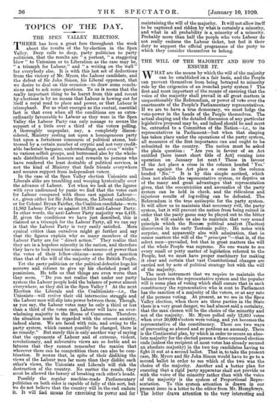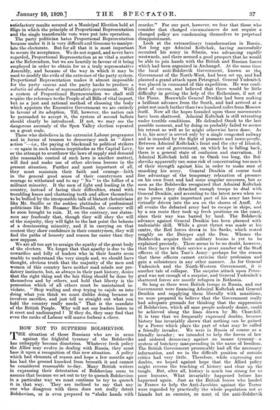THE WILL OF THE MAJORITY AND HOW TO ENSURE IT.
can prevent themselves from being betrayed to minority rule by the exigencies of an ironclad party system The first and most important of the means of ensuring that the voice of the majority shall prevail in all great matters is unquestionably the Referendum, or power of veto over the WHAT are the means by which the will of the majority can be established on a fair basis, and the People enactments of the People's Parliamentary representatives. If we are to have a true democracy, we must lodge the veto-power in the hands of the People themselves. The actual shaping and the detailed discussion of any particular legislative proposal may be, and indeed should be and must be, entrusted to a Committee of the Nation—i.e., to its representatives in Parliament—but when that shaping has taken place under the operations of the party system, all measures of the first importance can and ought to be submitted to the country. The nation must be asked the plain question : "Are you in favour of an Act entitled [here insert short title of Act] coming into operation on January 1st next ? Those in favour of the Act place a cross in the column headed Yes.' Those against the Act place a cross in the column headed 'No.'" It is by this simple method, which does not abolish the representative system, or deprive us of the many and great advantages that representation gives, that the eccentricities and anomalies of the party system can be held in check, and the ridiculous and injurious results of log-rolling can be defeated. The Referendum is the true antiseptic for the party system. It will allow us to maintain that necessary evil, the party system, but it will prevent the nation from being ruined in order that the party game may be played out to the bitter end. It will enable us also to maintain that very sound principle which the Roman political analyst (Tacitus) discovered in the early Teutonic polity. He notes with surprise, and apparently also with admiration, that in minor matters the will of the " principes "—that is, of the select men—prevailed, but that in great matters the will of the whole People was supreme. No one wants to see every small or petty matter of legislation referred to the People, but we must have proper machinery for making it clear and certain that vast Constitutional changes are carried not by acts of political strategy but with the will of the majority.
The next instrument that we require to maintain the balance between the representative system and the popular will is some plan of voting which shall ensure that in each constituency the representative who is sent to Parliament has the sanction of a majority of the voters, or at any rate of the persons voting. At present, as we see in the Spen Valley election, when there are three parties in the State there is a very great danger; we had almost said a certainty, that the man chosen will be the choice of the minority and not of the majority. Mr. Myers polled only 12,003 votes when over 30,000 electors were voting, and yet becomes the representative of the constituency. There are two ways of preventing so absurd and so perilous an anomaly. There is the Continental plan, by which in order to secure an abso- lute majority for the elected person a three-cornered election ends (unless the recipient of most votes has already secured an absolute majority) in the two top .candidates having to fight it out at a second ballot. That I13, to take the present case, Mr. Myers and Sir John Simon would have to go to a second ballot in order to see which of the two was the choice of the majority. Another and a better plan for ensuring that a rigid party apparatus shall not provide us with the voice of the minority rather than with the voice of the majority is the system of Proportional Repre- sentation. To this system attention is drawn in our present issue in a letter to the editor from Mr. Humphreys. The letter draws attention to the very interesting and satisfactory results secured at a Municipal Election held at Sligo in which the principle of Proportional Representation and the single transferable vote were put into operation. The party politician hates Proportional Representation because under it it is very difficult and tiresome to manipu- late the electorate. But for all that it is most important to secure its acceptance. We do not regard, and never have regarded, Proportional Representation as so vital a matter as the Referendum, but we are heartily in favour of it being employed in order to obtain for us a truly representative Assembly, and because of the way in which it may be used to modify the evils of the extremes of the party system. Proportional Representation makes it almost impossible for the party caucus and, the party hacks to produce a reduetio ad absurdum of representative government. With a system of Proportional Representation we shall still require the reference to the People of all Bills of vital import, but as a just and rational method of choosing the body which appoints the Executive Government we are entirely in favour of its adoption. Till, however, the nation can be persuaded to accept it, the system of second ballots should clearly be introduced. If not, we may see the dangerous anomaly of the Spen Valley election repeated on a great scale.
Those who disbelieve in the extremist Labour programme and in forms of treason to democracy such as "direct action "—i.e., the paying of blackmail to political strikers —or again in such ruinous ineptitudes as the Capital Levy, or the attempt to overthrow the laws of supply and demand (the reasonable control of such laws is another matter), will find and make use of other obvious lessons in the present situation. Further and most important of all, they must maintain their faith and courage—faith in the general good sense of their countrymen and courage to withstand and to say " No " to the follies of a militant minority. If the men of light and leading in the country, instead of facing their difficulties, stand with trembling knees and chattering teeth and allow themselves to be bullied by the irresponsible talk of blatant rhetoricians like Mr. Smillie or the sodden platitudes of professional politicians like Mr. Ramsay MacDonald, the country will be soon brought to ruin. If, on the contrary, our states- men say fearlessly that, though they will obey the will of the majority, they will fight to the last point the behests of a domineering minority, and if in carrying on that contest they show confidence in their countrymen, they will find the paths of honesty and reason far easier than they NW suppose.
We are all too apt to arraign the apathy of the great body of the electors. We forget that that apathy is due to the cowardice and, folly of leaders who in their hearts seem unable to understand the very simple and, we should have thought, obvious truth that the majority of the men and women of this country have neither mad minds nor pre- datory instincts, but, as always in their past history, desire that the right thing and the fair thing should be done by themselves and by others, and hold that liberty is the possession which of all others must be maintained in- violate. "Stop wailing and stop trying to cajole us into doing what you think we must dislike doing because it involves sacrifice, and just tell us straight out what you lacild the country really needs." That is the mandate of the British People. Why will not our leaders listen to it erect and undismayed ? If they do, they may find that even the ranks of Labour will scarce forbear a cheer.



































 Previous page
Previous page